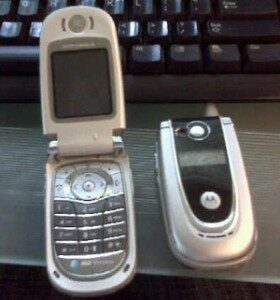If there is one (more) thing that makes no sense to me whatsoever, it’s international power standards. Electricity. That which spews out of the wall when you plug shit in. Juice, and not that of the link variety. It’s the same everywhere. My stuff runs out of batteries at the same rate in every country, yet multiple countries have different power standards. Forgive me for not knowing their technical names, but the prong things that stick into the wall are not the same worldwide. There is also that voltage problem. I am going to England tomorrow and thus I have to deal with it. I have one hundred little gadgets to take with me, but one has caused slightly more trouble than the others.
Most U.S. mobile phones won’t work with international SIM cards unless they’ve been “unlocked.” I could pay exorbitant international roaming rates, but I’d rather not. However, thanks to Gillian at SEOmoz, I have got my paws on a couple of unlocked telephones which will gladly accept other countries’ SIM cards. I took them to Australia. They are not the most graceful telephones on the face of the earth and thus, despite their good service, I have dubbed them the Fail Phones.
Taken with my far-superior BlackBerry
Yes, this story has a point. I lost the phone charger for the Fail Phones and I am going to England tomorrow. I needed a new one immediately, otherwise I’d be phoneless, Fail or otherwise, for almost two weeks. You can get anything on the Internet. You can get freaking unicorns on the Internet. Live ones. You so can. Of course you can get a phone charger for an ancient Motorola V600. I went to Google.
However, I have now discovered the one drastic flaw of online shopping. It’s very hard to find anything that exists at a store within driving distance which you can acquire immediately. There is a disconnect between online research and offline acquisition. It’s 9am Saturday and my plane leaves for Heathrow in less than thirty-six hours, and I have no time for shipping. My searches were useless.
As an avid online researcher, purchaser and overall Internet shopping fan, I had never before considered that I would not be able to find something that I could buy “in real life.” Obviously, common items are pretty simple to come by offline when you’ve discovered them on the Internet. However, these telephones are old. They don’t take a USB charger; the part that connects to the phone is a prong. AT&T, who issued the phones, no longer carry the chargers. Every online electronics store on the Net had one, but would ship it to me by Tuesday, at which point I’d be at the Future of Social Media conference at the Hilton Tower Bridge. Admittedly, I could have had one sent there, but the phones are out of batteries and have been for six months, and I want one to function when the wheels go down at Heathrow.
In short, finding rare goods online which you can purchase and pick up offline is more difficult than you’d imagine. I tried a range of other searches to indicate that I wanted to walk into a shop and hand over cash for my item, but Google didn’t comply. I was also getting very tired of calling stores and being almost laughed at by sales assistants who were stunned that I owned such an antiquated phone. I was about to resign myself to the fact that my methods of tidying were next to disastrous (I still haven’t found the pillow and don’t expect to), when searching for electronics stores and reluctantly partaking in some vertical searching paid off. I never thought I’d say this about anything, but Circuit City’s website (which I’ll never again call Circuit Shitty) agreed to cell me the phone charger online and let me pick it up at their store.
But I was lucky. Plenty of other stores didn’t hold the product or didn’t have it at a nearby location. However, I can’t account for shops that had the product and didn’t list it on their website as something they’d sell online. I’m completely sure this happens. I was also disappointed and yet not surprised that Google couldn’t identify offline retailers who listed what I wanted.
This fault is traceable to two sources: retailers think that if someone is searching online, they want to buy online. This isn’t necessarily the case. Plenty of people would rather use the Internet than the phone: everything from disabilities to a vague distaste for the telephone will send people to their computers before their phones or their cars. Additionally, there are plenty of reasons, including mine, why someone might not want to make the purchase online after finding the item.
The second problem is not Google’s fault, but it is Google. Google failed at multiple queries asking for products that could be purchased offline, but Google relies quite heavily on retailers to provide it the best information. Circuit City, and other stores that allow online ordering / offline pick-up, don’t make it clear enough to search engines. My natural inclination was to add keywords like “offline” and “in store” to my queries: as a retailer, I’d investigate who else did this and take advantage of it.
As it turned out, I canceled my order today. I had to do that over the phone. I found my original charger, safely filed in an abandoned shoulder bag at the bottom of my linen closet, where everyone would immediately think to leave it. What can I say: intuitive storage comes naturally to me. Thus, online shopping woes or not, I will have a telephone in London and it will have a charged battery. I’ll call you when I land ![]()




